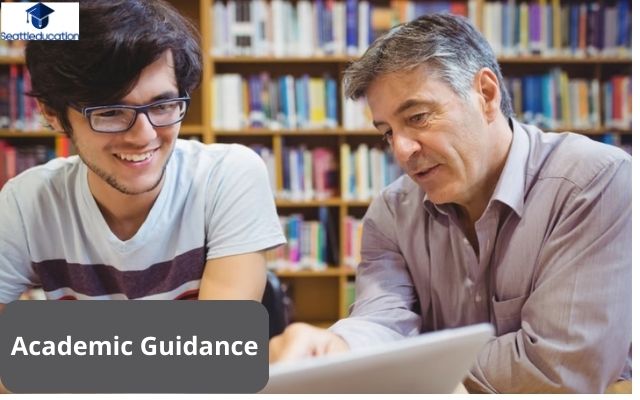What Can A School Counselor Do? The Ultimate Answer
What Can A School Counselor Do? As a student, you might have wondered what exactly can a school counselor do for you? Well, the truth is that your school counselor can provide many services and resources to help ensure academic success. From providing support during tough times to offering advice on college applications, there’s no shortage of ways in which a school counselor can be an invaluable asset.
In this article, I’ll discuss some of the most common things that your school counselor can do for you.
Academic Guidance
I’m here to help students with academic guidance. I can work collaboratively to get a better understanding of each student’s learning style and develop individualized strategies for success in the classroom.

Together, we can figure out what study habits are most effective, come up with test taking tips, and find appropriate time management tools that fit their lifestyle. With this knowledge in hand, students will feel confident as they work towards achieving their academic goals.
Moving onto career guidance, I’m also available to provide support related to making decisions about college majors or career paths post-graduation.
Career Guidance
As a school counselor, I am passionate about helping students reach their full potential. Career guidance is an important part of that process and can be the difference between feeling unfulfilled and achieving success.
Through career assessment, job search tips, resume building, interview practice, and career exploration, I can help students discover what they’re truly capable of accomplishing in life.
Career assessments are designed to identify interests, abilities, values, skillsets; all which will point individuals towards careers that align with those qualities. Job search tips provide direction on how to find opportunities tailored to a specific set of criteria while also developing strategies for gaining access into competitive positions.
Resume building helps create documents highlighting individual accomplishments as well as other key components employers look for when making hiring decisions.
Interview practice provides useful techniques on how to present oneself during interviews in order to make positive impressions on prospective employers. Finally, career exploration assists in understanding different roles within desired industries so more informed choices can be made when deciding upon future endeavors.
By providing these services it allows me to empower each student by giving them the tools necessary for self-advocacy and independence needed for navigating through today’s ever changing economy and job market successfully.
With this information at hand my goal is not just to assist in finding employment but rather aiding students in creating meaningful paths forward filled with both purpose and joy as they continue along their journeys in life. As we move onto discussing mental health support….
Mental Health Support
I’m a school counselor, and I take great pride in supporting my students. Mental health is at the core of our work together – it sets the foundation for personal growth and success.

To this end, I offer supportive listening to help students express their feelings and thoughts without judgment or criticism. I also facilitate self-reflection practice which helps them identify patterns that may be holding them back from reaching their goals.
Mindfulness strategies are another way I support mental wellbeing as they can help my students become more aware of their emotions and thought processes in real time. Additionally, positive reinforcement helps build motivation to continue working towards healthier habits while empathy building encourages understanding of others’ perspectives.
Together these tools create an environment where differences between school counselor and social worker better emotional regulation is possible.
Integral to any counseling session with me is providing guidance on how best to navigate life’s challenges both inside and outside of the classroom. This process requires a commitment to change over time, but having access to resources and tools makes it easier for us to find solutions that fit each individual student’s needs.
Substance Abuse Prevention
It is heartbreaking to witness teenagers succumb to peer pressure and substance abuse. As a school counselor, I am dedicated to helping young people make better decisions by providing them with essential tools for prevention and early intervention strategies.
I equip students with the skills they need to resist peer pressure through awareness-raising activities that emphasize safety and healthy decision making. Additionally, I work closely with teachers and administrators to ensure our school curriculum includes proper education about substance abuse risks as well as communication skills development.
Finally, I offer family counseling sessions to increase support networks around vulnerable youth at risk of engaging in dangerous behavior. This often involves teaching parents how to create an environment where their child can feel safe talking about difficult issues while also developing trusting relationships between families and my office:
- Encouraging open dialogue
- Finding common ground among parent/child disagreements
- Keeping lines of communication open even during times of tension
The next step is offering social and emotional support for these teens so that they can build resilience against difficult situations outside of the home.
Social And Emotional Support
Having discussed the importance of substance abuse prevention, it is also essential to address social and emotional support. As a school counselor, I can provide guidance on how to foster healthy relationships through communication skills and stress relief techniques. Additionally, I can help students develop their emotional literacy with self care tips for managing difficult emotions.

One way that I encourage my students to practice self-care is by recognizing when they need a break from overwhelming situations or activities in order to prevent burnout. This could involve taking time away from studying to do something enjoyable like going for a walk or listening to music. For many students, this type of activity helps them refocus and de-stress so they are better able to tackle challenging tasks afterwards to answer questions What Do I Need To Be A School Counselor?
In addition to offering methods of relaxation, I also strive to teach my students effective ways of communicating with peers and adults in order to cultivate strong relationships. Establishing clear boundaries while expressing your thoughts and feelings in an assertive manner are important components of successful communication that can be learned over time with practice.
Through role playing activities and other interactive lessons, I work with students on honing these interpersonal skills which will benefit them throughout their lives. With this knowledge under their belts, they can then move onto developing strategies for conflict resolution in future conversations.
Conflict Resolution
It can be devastating to witness a conflict between two people. As a school counselor, it is my job to help the parties involved come together and find an amicable resolution. I use various techniques to facilitate this process – all while seeking alternatives, fostering empathy, using non-violent communication, identifying triggers, and examining motivations of each person’s behavior.
Here are four ways in which I work to resolve conflicts:
- Listen actively and without bias
- Encourage open dialogue among the affected parties
- Suggest creative solutions that both sides may not have considered before
- Guide the conversation toward understanding why the conflict arose in the first place
By focusing on these strategies during moments of tension or disagreement, we can hopefully diffuse any situation and reach a mutually beneficial outcome for everyone involved. With this in mind, we move forward into our next topic – bullying prevention…
Bullying Prevention
As a school counselor, it is essential to have strategies in place for bullying prevention. Bullying has become an ever-increasing problem in schools and can be damaging for both those being bullied as well as the bullies themselves.
One of the teacher salary comparison bullying prevention is peer mediation which involves training students how to recognize when another student needs help and knowing how to offer support. In addition, positive reinforcement from teachers and other adults can go a long way towards creating a safe environment where all students feel supported.
Student advocacy is also important when dealing with bullying issues, allowing children who are victims of bullying to develop their own problem solving skills so they can learn how to handle future situations effectively.
This could involve teaching them assertiveness techniques or helping build self esteem by encouraging healthy coping mechanisms such as exercise, art therapy or talking through difficult feelings with supportive peers or adults.
It’s vital that school counselors create strong relationships with their students so they know when something isn’t right and can intervene quickly if needed. By getting ahead of potential problems early on, we can ensure our kids have safe learning environments free from fear and intimidation.
As we move into the next section about crisis intervention, it’s clear that taking an active role in preventing any type of harm within our educational system should always remain at the forefront of our efforts.
Crisis Intervention
I hear the students’ voices all around me. As they tell their stories of stress, struggle and sadness, I am reminded why I chose to become a school counselor – because these students need champions in their corner.
It is my job to provide crisis intervention so that young people have the tools necessary for self-care tips, media literacy, student advocacy and overall well-being. I strive to empower students with knowledge by teaching them how to manage stresses through active listening and stress management strategies.
This includes helping them develop study skills, understand academic expectations and form positive relationships with peers and adults. Additionally, I work toward creating an environment where every student feels safe, supported and accepted regardless of race or gender identity.
It is my mission as a school counselor not only to help address current crises but also prepare students for life after high school – college preparation. With this goal in mind, I take part in activities such as career exploration events, scholarship information sessions, SAT/ACT test prep workshops and more – all designed to give essential qualifications for school counseling an edge when it comes time to apply for college.
From there we can set our sights on even higher goals!
College Preparation
Now that you’ve considered college preparation, let’s dig into it a bit further. As a school counselor, I’m here to help students navigate the process of deciding on colleges and creating an academic plan for their future.
College search tips, scholarship resources, financial aid advice – these are all areas where I can provide assistance in helping each student find the right fit for them. From finding schools based on criteria like location or size to discovering potential scholarships and researching different types of financial aid options available, I’m here to help make sure every student has all the information they need to make informed decisions about their education.
Working together with my students is key when creating a college plan. We’ll review components such as career exploration, research strategies, time management skills and test prep methods so they have everything they need to be successful during this exciting journey.
It’s also important that we look at academics when planning for college; exploring majors and courses of study while keeping GPA goals in mind is essential for staying organized and on track.
Throughout the entire process from start to finish, I’m there every step of the way offering guidance and support along with providing helpful tools like organizational techniques and goal setting ideas.
With careful planning ahead of time, students will be ready come application season feeling confident about their choices moving forward – no longer overwhelmed by the thought of tackling higher education but instead excitedly anticipating what lies ahead!
Now onto discussing some time management strategies…
Time Management Strategies
I’m a school counselor, and I firmly believe that one of the best ways to help students succeed is through better time management.
There are several strategies I can use with my students to encourage them to manage their time more effectively. Positive reinforcement is key – emphasizing how important it is for them to stick to their schedules and finish tasks on time will go a long way in helping them reach their goals.
Time scheduling is also an important tool for successful time management. By working with each student individually, I can create customized timetables that work best for them so they know when specific tasks need to be done every day or week. This helps give structure while still allowing flexibility if something unexpected comes up.
Finally, goal setting and reward systems are two powerful tools I use to motivate my students. Setting clear, achievable goals encourages positive behavior while reducing stress levels by breaking down big projects into smaller chunks that are easier to complete. Establishing rewards also serves as an incentive; this could involve giving praise or tangible items like stickers or small treats after reaching certain milestones throughout the semester.
Referral Services
Now that we’ve discussed time management strategies, let’s move on to referral services.
A school counselor can provide students and their families with referrals to a variety of resources outside of the school environment. These could include mental health professionals, peer mediation programs, stress management courses, self awareness practices, mentoring programs, or diversity education initiatives.
It’s important for counselors to be aware of all local support systems and have updated knowledge about what’s available in the community. Counselors should also make sure they understand each student’s particular needs and create a customized plan to help them find suitable external resources if needed.
Counselors must ensure that students receive appropriate care from trusted sources who specialize in areas such as substance abuse treatment, bullying prevention, and social-emotional learning. With this assistance available beyond the walls of the school campus, students are more likely to feel supported both inside and outside of classroom settings.
Conclusion
School counselors are an invaluable resource for students, parents, teachers and administrators. They provide support to those in need and can help improve a school’s overall climate.
School counselors come with different qualifications, training and cost – so it is important to consider all your options before you decide which counselor will best suit the needs of your student or school district.
By understanding what a school counselor can do and how they can help, you can ensure that everyone involved receives the right kind of assistance.
At the end of the day, having access to a qualified professional who understands both educational and emotional issues is incredibly valuable – no matter what role they play in your life or in the lives of others around you.
With their knowledge, expertise and compassionate approach, school counselors make sure that education remains accessible to all individuals regardless of their backgrounds or circumstances.





